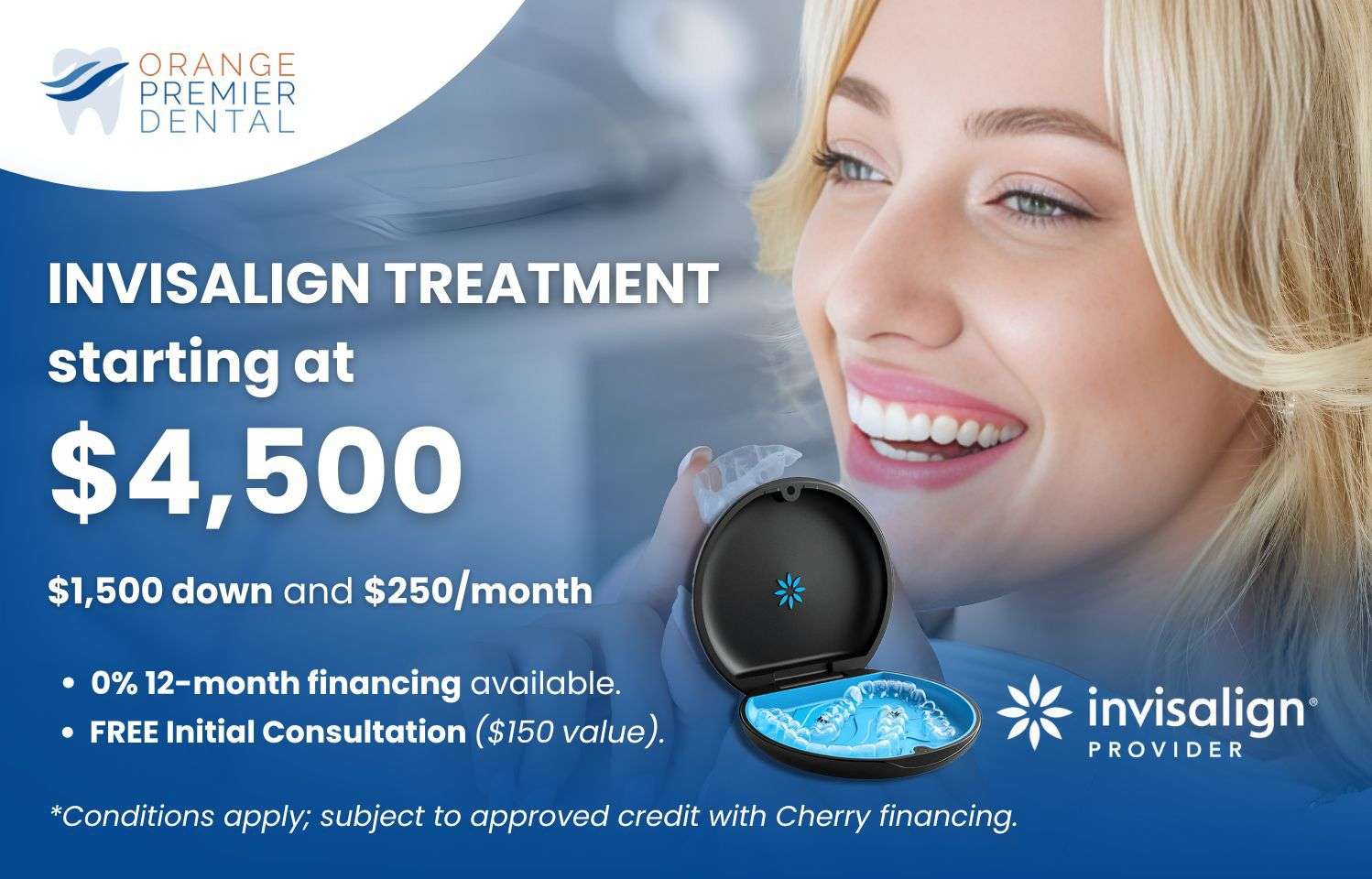Have you ever winced when sipping your morning coffee, or felt a sting when biting into an ice cream? If that sounds like you, don’t worry, you’re not the only one. Tooth sensitivity is one of the most common dental concerns people face, and it can be uncomfortable to live with.
At Orange Premier Dental, Dr. Sheriff often reminds his patients that their teeth should never stop them from enjoying the foods and drinks they love. Sensitivity is not something you have to “just live with; it’s your body’s way of feeling something that needs your attention.”

What is Tooth Sensitivity?
Tooth sensitivity, also known as dentin hypersensitivity, happens when the protective layers of your teeth wear down or your gums recede, exposing the underlying dentin. Dentin is full of tiny microscopic tubules that go into the inner part of your tooth, and when it’s exposed, those tubules act like a “highway” that allows hot, cold, sweet, and sour substances to cause severe pain.
What Causes Tooth Sensitivity?
Many of our patients ask, ” Why are my teeth sensitive?” To be honest, there is no one real answer to that question, but there are many daily habits and conditions that can lead to sensitive tooth pain.
1. Worn Enamel
Enamel is tough, but over time, it can wear down due to certain habits like brushing too hard or consuming acidic foods.
2. Gum Recession
When your gums recede, the roots of your teeth are exposed. Roots are more likely to break because they don’t have enamel. Recession can also be caused by gum disease, aggressive brushing, or natural ageing.
3. Cavities and Decaying
Your dentin can be affected because cavities create a clear pathway to your dentin, and that’s why tooth sensitivity to sweet things is often an early sign of decay.
4. Cracked or Chipped Teeth
Don’t ignore the small cracks; they can expose dentin and make your teeth “suddenly sensitive.”
5. Dental Treatments
Sometimes, sensitivity shows up after you’ve gotten a dental treatment. One of the times this can happen is when you’ve gotten a whitening. It can leave your teeth sensitive after teeth whitening.
The second time is when you get a filling. It may cause tooth sensitivity after filling, but it’s usual for a short period. Then the other time is when you get adjustments. Orthodontic adjustments trigger temporary pain.
6. Other Medical Factors
There are many causes of tooth sensitivity, and it’s not just due to brushing or sugar consumption. Acid reflux and frequent vomiting (from bulimia or pregnancy morning sickness) expose teeth to stomach acid that wears away enamel, and even sinus infections can trigger sensitivity by adding pressure and pain to the upper teeth.
Symptoms That Need Attention
Not all tooth sensitivity is the same. Some people’s cases are mild, and others are extreme, so for you to be safe, see a dentist for sensitive teeth if you notice any of these signs:
- Pain that lasts for more than a few seconds
- Sensitivity in just 1 tooth
- Pain after chewing or biting
- A visible crack/s or gum changes

Professional Treatments for Sensitive Teeth
At Orange Premier Dental, we take a personalized approach when treating sensitive teeth, because the right option depends on the cause. And the treatment usually goes like this:
- Desensitizing Treatments: Fluoride varnish to strengthen enamel. A unique treatment for sensitive teeth eliminates pain signals.
- Restorative Options: Fillings or bonding for exposed dentin. Crowns or inlays for cracked or weak teeth
- Gum Treatment: Deep cleaning (scaling and root planning) to treat gum disease. Gum graft surgery to cover exposed roots
- Root Canal Therapy: – In severe cases, a root canal can remove nerve pain while saving the tooth at the same time.
Home Remedies for Sensitive Teeth
Not all sensitivity needs a major treatment, sometimes, small changes at home make a huge difference. Plus, the home remedies will save you a bunch of money in the future. Here are practical home remedies for sensitive teeth that you can start to do today.
1. Use the Best Toothpaste for Sensitive Teeth: Look for desensitizing toothpaste with potassium nitrate or fluoride. Many of our patients used to ask about the best toothpaste for sensitive teeth, and we always gave them one piece of advice: ” Choose one with fluoride, and stick to it. With consistency, you’ll see a change.”
2. Gentle Brushing Habits: Always use a soft-bristled toothbrush, and brush in small circles, not back-and-forth scrubbing.
3. Adjust Your Diet: Limit your consumption of acidic beverages, rinse with water after consuming acidic foods, and include foods high in calcium, such as yoghurt and cheese.
4. Stay Hydrated: If you always have a dry mouth, it increases sensitivity, so drink water often to prevent this.
5. Night Guards for Grinding: If you have a problem grinding your teeth, a night guard can help prevent further damage. Wear a night guard.
6. Salt Water Rinse for Sensitive Teeth: A simple saltwater rinse for sensitive teeth will help reduce bacteria and calm the inflammation. Gargle for about 4 minutes and spit out the water. Do this 3-4 times before going to bed.
7. Natural Remedies for Sensitive Teeth: Some people find relief with green tea rinses or clove oil. These natural remedies for sensitive teeth are not a cure but can support overall comfort.
Final Thoughts
Tooth sensitivity may feel small, but it greatly impacts your daily comfort. From sudden tooth sensitivity to long-term discomfort, the solutions are out there. Whether you need home remedies for sensitive teeth, professional treatment for sensitive teeth, or just guidance on the best toothpaste, you don’t have to navigate it alone.
At Orange Premier Dental, Dr. Sheriff Elgamal and his caring team are here to listen, guide, and restore comfort to your smile. Now is the perfect time to reach out. Book your appointment now.
Because life’s too short to let sensitive tooth pain steal the joy from your morning coffee or evening ice cream.
FAQs on Sensitive Teeth
1. What causes sudden tooth sensitivity?
It can come from a crack, a cavity, or recent dental treatment. A small crack can expose the inner layers of your tooth, making it sensitive to hot or cold. Cavities eat away at enamel, leaving nerves less protected. Even after dental work, like fillings, crowns, or whitening, your teeth can feel extra sensitive until they adjust.
2. How to treat sensitive teeth at home?
Try using a desensitising toothpaste to calm nerve endings, rinse with salt water to reduce irritation and strengthen gums, and cut back on acidic foods that wear away enamel.
3. Can tooth sensitivity be reversed?
Yes, depending on the cause. Once enamel is lost, it can’t grow back, but treatments, like bonding, fluoride, or dental restorations, along with good daily care, can protect your teeth and keep the pain under control.
4. Why are my teeth sensitive all of a sudden?
Sudden changes in sensitivity often point to a new cavity, a cracked tooth, or gums pulling back and exposing the roots. Each of these causes the nerves to be less protected, which is why the pain can feel sharp and unexpected.

Myths About Tooth Sensitivity
Myth: “Does tooth sensitivity go away on its own?”
Sometimes temporary sensitivity fades, but ongoing discomfort usually needs treatment.
Myth: “It’s normal as you age.”
Common, yes. Normal, no. There are always solutions.
Myth: “If toothpaste helps, you don’t need a dentist.”
Relief doesn’t always mean the underlying cause is fixed.

Dr. Shierf Elgamal is the lead dentist at Orange Premier Dental in Orange County. A graduate of Loma Linda University School of Dentistry (2013), he has extensive experience across all areas of general dentistry and is dedicated to providing patients with honest, straightforward care. Over the years, Dr. Elgamal has worked in multiple practices, gaining valuable skills that he now brings to his own clinic.







